Here are seven documentaries from this year I heartily recommend to you. Links go to my full reviews.
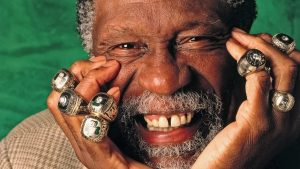
#1) “Bill Russell: Legend” Regardless of your age, and even if you’re not a basketball fan, you should know the name Bill Russell. He led the Boston Celtics to eleven NBA championships — he had more rings than fingers! — a record no one else has bested in a team sport. The documentary lays out the story of his career but isn’t just a couple of hours of highlights. It also tells the story of Russell’s struggles against racism, not just in the American south, but in Reading, Massachusetts, the Boston suburb where residents admired what he did on the parquet floor enough to honor Russell with a dinner, but didn’t want him and his family living on their block. And there’s footage of Russell’s role as an outspoken advocate for years in the civil rights movement. Sam Pollard’s documentary offers a vivid look at a man for whom the word “legend” hardly seems enough.
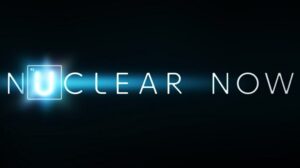
#2) “Nuclear Now” Let’s get this out of the way first: I’ve been skeptical about anything Oliver Stone has claimed since the release of his 1991 movie, “JFK.” But though Stone directed and narrates “Nuclear Now: Time To Look Again,” he leaves much of the story to scientists who have worked in the field of nuclear power for decades. They make a good case for renewing investment in nuclear power plants as a source of clean energy that would help battle global climate change. He also delves into the accidents at Chernobyl in 1986 and Fukushima in 2011, both of which further devastated the industry — but Stone points towards the success of the US Navy’s nuclear fleet of hundreds of vessels. One of the things I found most fascinating about “Nuclear Now” was its inclusion of new, modern versions of reactors that have smaller footprints than the ones built decades ago. There are even some small enough to power a single community. “Nuclear Now: Time To Look Again” is not just a well-made documentary. It’s also an important one, on the same visionary scale as Al Gore’s “An Inconvenient Truth.”
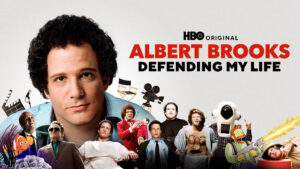
#3) “Albert Brooks: Defending His Life” Rob Reiner directed this career retrospective of his longtime friend, Albert Brooks. It includes the two of them sitting and reminiscing about Brooks’ years doing TV variety shows (including Johnny Carson’s), his comedy albums, the short films he made for the first season of “Saturday Night Live,” his brilliant feature-length comedies (“Real Life,” “Modern Romance,” “Lost In America,” “Defending Your Life”), and his roles in other directors’ movies (“Taxi Driver,” “Broadcast News,” “Drive”). Though I’m such a fan of Brooks that I knew almost all the stories in the doc, I still enjoyed hearing him tell them again — and could sit and watch him talking with Reiner for hours more.

#4) “Immediate Family” If you bought rock albums during the singer-songwriter era of the 1970s, you often saw the names of four extraordinary musicians on the back covers — Danny Kortchmar, Leland Sklar, Russ Kunkel, and Waddy Wachtel. Just as the studio musicians of The Wrecking Crew played on hundreds of songs backing up big name artists in the 1960s, so did those four guys in the succeeding decades, working with James Taylor, Carole King, Phil Collins, Stevie Nicks, Jackson Browne, Keith Richards, Linda Ronstadt, and Don Henley, to name a few. They all share amusing anecdotes about their years working together and creating the music that became the soundtrack of multiple generations. That’s quite a legacy, and director Denny Tedesco (who also memorialized The Wrecking Crew on film) captures it beautifully.
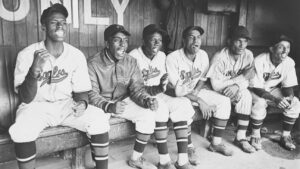
#5) “The League” is about the Negro League baseball teams that thrived in the years before Jackie Robinson broke the Major League color barrier — and then went bankrupt. There’s archival film footage, still photos, and audio clips to tell the story of the rosters and personalities that thrived over the course of the next four decades, including legendary pitcher Satchel Paige, home run king Josh Gibson, fielding wizard Buck O’Neil, and many more. Also heard and seen in the documentary are Willie Mays, Hank Aaron, and Monte Irvin, along with Larry Doby (first Black player in the American League). In his previous documentaries, director Sam Pollard compiled memorable tributes to Arthur Ashe, Sammy Davis Jr. (which I discussed with him in 2017), and Bill Russell (which I reviewed earlier this year). “The League” stands alongside them as another well-told deep-dive into a part of American history some of us thought we already knew — but didn’t.
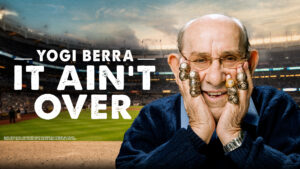
#6) “Yogi Berra: It Ain’t Over” In the opening scene, a young woman remembers watching the 2015 Major League Baseball All-Star game, where the four greatest living players (according to fan voting) were introduced: Hank Aaron, Johnny Bench, Sandy Koufax, and Willie Mays. But they left out Yogi Berra, who had more MVP awards and won more World Series than the others combined. Yogi happened to be her grandfather, who was sitting next to her, as surprised as she was that he’d been left out. That’s the basis of this documentary, which looks back at the Yankees legend’s career, his personal life, and — oh, yeah — all those famous Yogi-isms, including the one that inspired the title, “It ain’t over till it’s over.” I never wrote a full review of this doc, but strongly recommend it. You don’t have to be a fan of baseball in his era or any other to enjoy Yogi’s story.
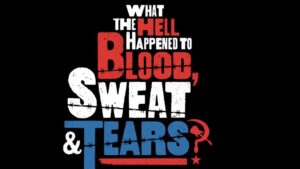
#7) “What The Hell Happened To Blood, Sweat & Tears?” This doc is more than just a history lesson about a band that was so hot in the late 1960s that its eponymous second LP beat The Beatles’ “Abbey Road” for Album Of The Year at the Grammys (one of five it won that year). It’s also about how the band was blackmailed by the US State Department into going on tour behind the Iron Curtain. Faced with losing frontman David Clayton-Thomas at the height of their popularity, the band acquiesced and made the trip, with a film crew capturing over sixty hours of footage — but none of it was seen until 2023 because of the reaction of attendees in the second country they visited, Romania. While there, BST witnessed the very real oppression by the totalitarian state headed by dictator Nicolae Ceausescu, including armed guards and dogs attacking concertgoers who were having too much fun and chanting, “USA! USA!” When they returned to the United States and talked about what they’d seen, the musicians were lambasted by conservatives for speaking out against the Vietnam War and by liberals for representing Richard Nixon’s administration. It’s a fascinating story — and the music is so, so good.
